贵州省贵阳清镇北大培文学校高中英语必修一导学案:Unit 5 课时作业(3) Word版缺答案
贵州省贵阳清镇北大培文学校高中英语必修一导学案:Unit 5 课时作业(1) Word版缺答案
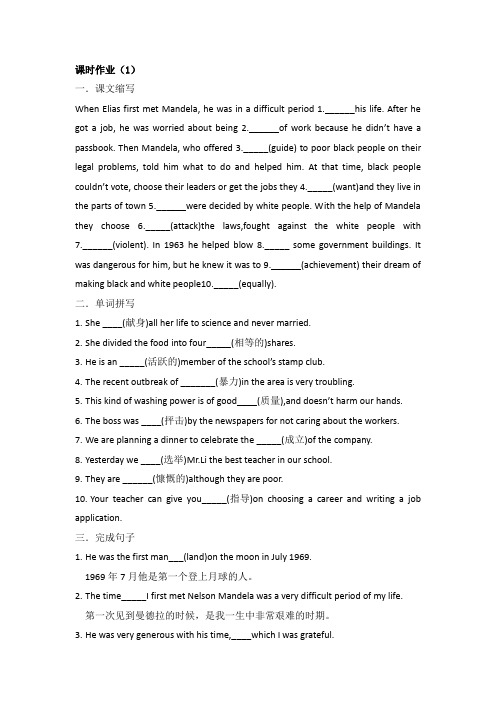
课时作业(1)一.课文缩写When Elias first met Mandela, he was in a difficult period 1.______his life. After he got a job, he was worried about being 2.______of work because he didn’t have a passbook. Then Mandela, who offered 3._____(guide) to poor black people on their legal problems, told him what to do and helped him. At that time, black people couldn’t vote, choose their leaders or get the jobs they 4._____(want)and they live in the parts of town 5.______were decided by white people. With the help of Mandela they choose 6._____(attack)the laws,fought against the white people with 7.______(violent). In 1963 he helped blow 8._____ some government buildings. It was dangerous for him, but he knew it was to 9.______(achievement) their dream of making black and white people10._____(equally).二.单词拼写1.She ____(献身)all her life to science and never married.2.She divided the food into four_____(相等的)shares.3.He is an _____(活跃的)member of the school’s stamp club.4.The recent outbreak of _______(暴力)in the area is very troubling.5.This kind of washing power is of good____(质量),and doesn’t harm our hands.6.The boss was ____(抨击)by the newspapers for not caring about the workers.7.We are planning a dinner to celebrate the _____(成立)of the company.8.Yesterday we ____(选举)Mr.Li the best teacher in our school.9.They are ______(慷慨的)although they are poor.10.Your teacher can give you_____(指导)on choosing a career and writing a job application.三.完成句子1.He was the first man___(land)on the moon in July 1969.1969年7月他是第一个登上月球的人。
贵州省贵阳清镇北大培文学校高中英语一导学案:Unit5Period5Writing缺答案

Unit 5 Period 5 Writing【学习目标】1。
让学生掌握写人物描写的技能。
2。
指导学生写记叙文并完成相应的作业。
【技巧点拨】1.人物要用有代表性,选择人物的重要事迹或者突出的性格特点,才能充分表现人物。
2.语言要精练、生动,不要平铺直叙,也不可说大话。
3.时态和人称要选准,写人的记叙文一般要用一般过去时和第三人称,自我介绍用第一人称,若写当前的情况也可用一般现在时、现在完成时等。
4.最重要的是要写清楚人物、事件两大方面.六要素:who,what,when,where,why,how要交代清楚。
【常用语块】1.遵守____________________________________2.展示天赋____________________________________3.建立____________________________________4.对……感兴趣____________________________________5.致力于____________________________________6.做贡献____________________________________7.出生于____________________________________8.毕业于____________________________________9.从事于____________________________________10.死于____________________________________【套用句式】1.鲍勃迪伦1941年出生于美国,是美国著名的歌手、音乐家、诗人。
__________________________________________________________ __2.他一直遵守美国音乐的传统。
__________________________________________________________ _3.在读大学期间,他对民谣产生了兴趣。
贵州省贵阳清镇北大培文学校高中英语必修一导学案:Unit1 第三部分 精品
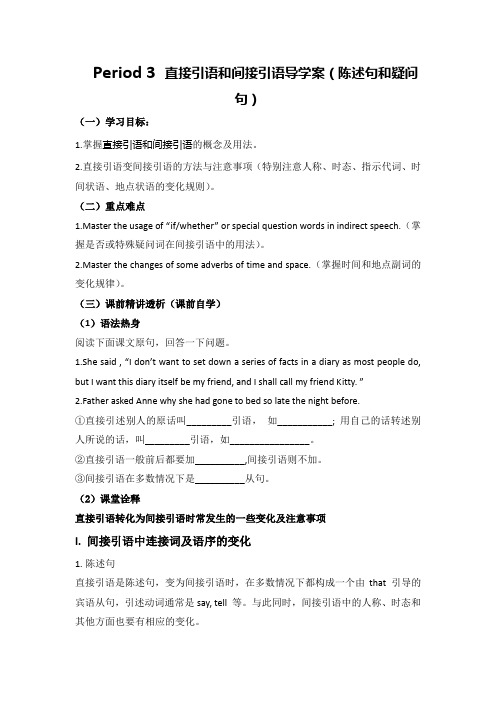
Period 3 直接引语和间接引语导学案(陈述句和疑问句)(一)学习目标:1.掌握直接引语和间接引语的概念及用法。
2.直接引语变间接引语的方法与注意事项(特别注意人称、时态、指示代词、时间状语、地点状语的变化规则)。
(二)重点难点1.Master the usage of “if/whether” or special question words in indirect speech.(掌握是否或特殊疑问词在间接引语中的用法)。
2.Master the changes of some adverbs of time and space.(掌握时间和地点副词的变化规律)。
(三)课前精讲透析(课前自学)(1)语法热身阅读下面课文原句,回答一下问题。
1.She said , “I don’t want to set down a series of facts in a diary as most people do, but I want this diary itself be my friend, and I shall call my friend Kitty. ”2.Father asked Anne why she had gone to bed so late the night before.①直接引述别人的原话叫_________引语,如___________; 用自己的话转述别人所说的话,叫_________引语,如________________。
②直接引语一般前后都要加__________,间接引语则不加。
③间接引语在多数情况下是__________从句。
(2)课堂诠释直接引语转化为间接引语时常发生的一些变化及注意事项I. 间接引语中连接词及语序的变化1.陈述句直接引语是陈述句,变为间接引语时,在多数情况下都构成一个由that 引导的宾语从句,引述动词通常是say, tell 等。
贵州省贵阳清镇北大培文学校高中英语必修一导学案:Unit 3 课后作业三 精品
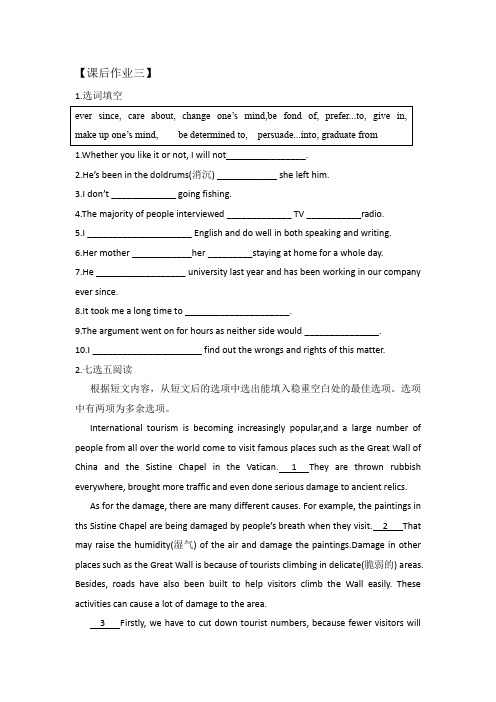
【课后作业三】1.选词填空1.Whether you like it or not, I will not________________.2.He’s been in the do ldrums(消沉) ____________ she left him.3.I don’t _____________ going fishing.4.The majority of people interviewed _____________ TV ___________radio.5.I _____________________ English and do well in both speaking and writing.6.Her mother ____________her _________staying at home for a whole day.7.He __________________ university last year and has been working in our company ever since.8.It took me a long time to _____________________.9.The argument went on for hours as neither side would _______________.10.I ______________________ find out the wrongs and rights of this matter.2.七选五阅读根据短文内容,从短文后的选项中选出能填入稳重空白处的最佳选项。
选项中有两项为多余选项。
International tourism is becoming increasingly popular,and a large number of people from all over the world come to visit famous places such as the Great Wall of China and the Sistine Chapel in the Vatican. 1 They are thrown rubbish everywhere, brought more traffic and even done serious damage to ancient relics.As for the damage, there are many different causes. For example, the paintings in ths Sistine Chapel are being damaged by people’s breath when they visit. 2 That may raise the humidity(湿气) of the air and damage the paintings.Damage in other places such as the Great Wall is because of tourists climbing in delicate(脆弱的) areas. Besides, roads have also been built to help visitors climb the Wall easily. These activities can cause a lot of damage to the area.3 Firstly, we have to cut down tourist numbers, because fewer visitors willresult in less damage. Secondly, we should make strict rules about which areas people can visit and what they can do when they get there. 4 People will not be allowed to walk off the paths. Visitors to indoor places can be asked to wear masks to protect the paintings.In short, it is necessary to control tourism in famous places. 5 And people who live hundreds of years later will have no chance to see these great places.A.For example, special paths can be built.B.What can we do to with these problems?C.The Great Wall was built over 2000 years ago.D.However, these visitors have caused many problems.E.Traveling is the best way for us to get to know the world.F.Otherwise, these places will disappear from our planet.G.Their breath contains very small drops of water that are present in the air.1.______2._______3._______4._______5._______。
贵州省贵阳清镇北大培文学校高中英语必修一导学案:Un
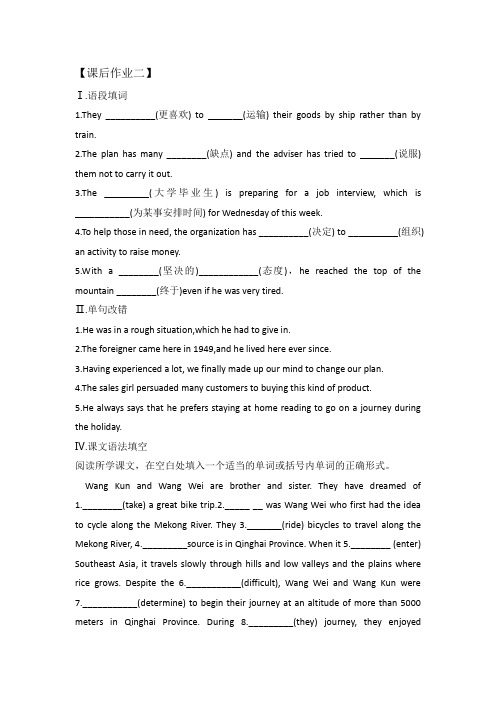
【课后作业二】Ⅰ.语段填词1.They __________(更喜欢) to _______(运输) their goods by ship rather than by train.2.The plan has many ________(缺点) and the adviser has tried to _______(说服) them not to carry it out.3.The _________(大学毕业生) is preparing for a job interview, which is ___________(为某事安排时间) for Wednesday of this week.4.To help those in need, the organization has __________(决定) to __________(组织) an activity to raise money.5.With a ________(坚决的)____________(态度),he reached the top of the mountain ________(终于)even if he was very tired.Ⅱ.单句改错1.He was in a rough situation,which he had to give in.2.The foreigner came here in 1949,and he lived here ever since.3.Having experienced a lot, we finally made up our mind to change our plan.4.The sales girl persuaded many customers to buying this kind of product.5.He always says that he prefers staying at home reading to go on a journey during the holiday.Ⅳ.课文语法填空阅读所学课文,在空白处填入一个适当的单词或括号内单词的正确形式。
贵州省贵阳清镇北大培文学校高中英语必修一导学案:Un
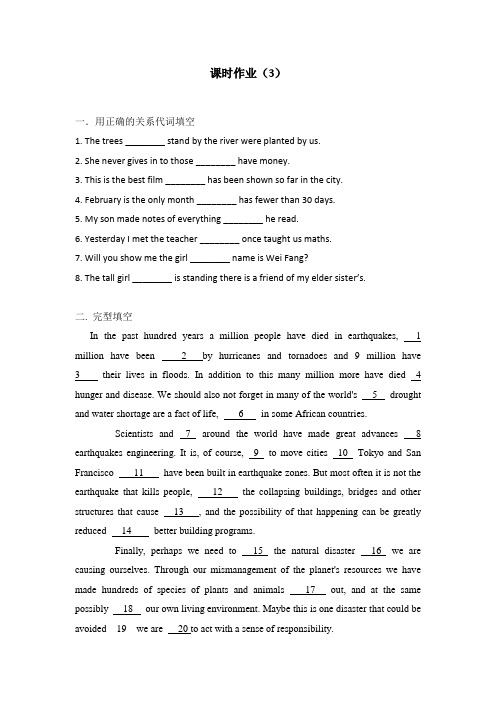
课时作业(3)一.用正确的关系代词填空1. The trees ________ stand by the river were planted by us.2. She never gives in to those ________ have money.3. This is the best film ________ has been shown so far in the city.4. February is the only month ________ has fewer than 30 days.5. My son made notes of everything ________ he read.6. Yesterday I met the teacher ________ once taught us maths.7. Will you show me the girl ________ name is Wei Fang?8. The tall girl ________ is standing there is a friend of my elder siste r’s.二. 完型填空In the past hundred years a million people have died in earthquakes, 1 million have been 2 by hurricanes and tornadoes and 9 million have 3 their lives in floods. In addition to this many million more have died 4 hunger and disease. We should also not forget in many of the world's 5 drought and water shortage are a fact of life, 6 in some African countries.Scientists and 7 around the world have made great advances 8 earthquakes engineering. It is, of course, 9 to move cities 10 Tokyo and San Francisco 11 have been built in earthquake zones. But most often it is not the earthquake that kills people, 12 the collapsing buildings, bridges and other structures that cause 13 , and the possibility of that happening can be greatly reduced 14 better building programs.Finally, perhaps we need to 15 the natural disaster 16_ we are causing ourselves. Through our mismanagement of the planet's resources we have made hundreds of species of plants and animals 17 out, and at the same possibly 18 our own living environment. Maybe this is one disaster that could be avoided__19__we are 20 to act with a sense of responsibility.1. A. other B. others C. another D. the other2. A. killed B. hurt C. hit D. damaged3. A. made B. lived C. earned D. lost4. A. of B. at C. for D. on5. A. states B. countries C. continents D. villages6. A. especial B. special C. especially D. specially7. A. farmers B. teachers C. soldiers D. engineers8. A. from B. in C. for D. with9. A. impossible B. possible C. necessary D. natural10. A. so as B. such as C. instead of D. in case11. A. where B. what C. when D. that12.A. but B. and C. so D. because13. A. deaths B. problems C. earthquakes D. disasters14. A. with B. in C. by D. under15. A. regard B. organize C. make D. consider16. A. who B. which C. what D. how17. A. dying B. staying C. leaving D. keeping18. A. protected B. harmed C. destroyed D. damaged19. A. that B. whether C. if D. unless20. A. willing B. sorry C. afraid D. angry四、语法填空In 1914, Thomas Edison, at the age of 67, lost his factory, 1 was worth a few million dollars, to fire. It had very little insurance. No longer a young man, Edison watched his lifetime effort 2 (go) up in smoke and said, "There is great value in disasters. All our mistakes are burnt up. Thank God we can start anew." In spite of disasters, three weeks later, 3 invented the phonograph. What 4 attitude!Below are more examples of the 5 (fail) of successful people: Thomas Edison failed 6 (approximate) 10, 000 times while he 7 (work) on the light bulb.Henry Ford fired Lee Iacocca at the age of 54. Young Beethoven 8 (tell) that he had no talent for music, 9 he gave some of the best music to the world.Setbacks are inevitable in life. A setback can act as a driving force and also teach us humility. In grief you will find courage and faith 10 (overcome) the setback.五..短文改错Dear Li Hua,I'm very glad to hear from you. I know you have difficulty remember English words. As for it,my suggestions are as follows. Firstly, you should read aloud as often as possible, for they candevelop your sense of language. Secondly, you must read more. Reading can certain enlarge yourvocabulary and you can easily find plenty of reading materials that interests you. Thirdly,whenever you will meet a new word, it isn't enough write it down. The more you repeat it, the wellyou'll remember it. Finally, you must put your vocabulary into practice, like writing English letterto me. Only with this way can you use the language freely.I hope the above advice can be of much helpful to you.Best wishes!Yours,David六.7选5 (选做题)If you are like most international students, you are probably pretty comfortable reading and writing in English, but not as comfortable with listening and speaking in the language. 1 .Make friends with American students. Many international students end up making friends with a lot of—or only—other international students. 2 Hanging out with natives not only naturally pushes you to improve your spoken English, but also helps you pick up cultural and social information.Learn from American friends. Tell your American friends that you are trying to improve your listening and speaking skills, and would like them to help you. If you pronounce a word incorrectly, or misuse an idiom, you want them to tell you.3 .Increase your knowledge. 4 If you have known about the topics that are likely to be discussed in conversation, you have a much better chance of understanding people when they talk, and of being able to express yourself well.5 If you have to explain something to someone, you have a strong desire to pronounce everything as well as you can, and find other ways to explain yourself. Finally, this becomes a good habit. Many people have asked me how I learned to speak English fluently, and I think it is because of my being a math teacher in college for years.A. I don't think this is a good idea.B. You will learn much faster this way.C. If possible, become a teacher at your school.D. It's a win-win opportunity for international students.E. Read books, keep up with news and watch popular shows and movies.F. It's a good way to make some extra cash while improving your English.G. Below are some tips to help you to improve your conversational skills.。
贵州省贵阳清镇北大培文学校高中英语必修一导学案:Un
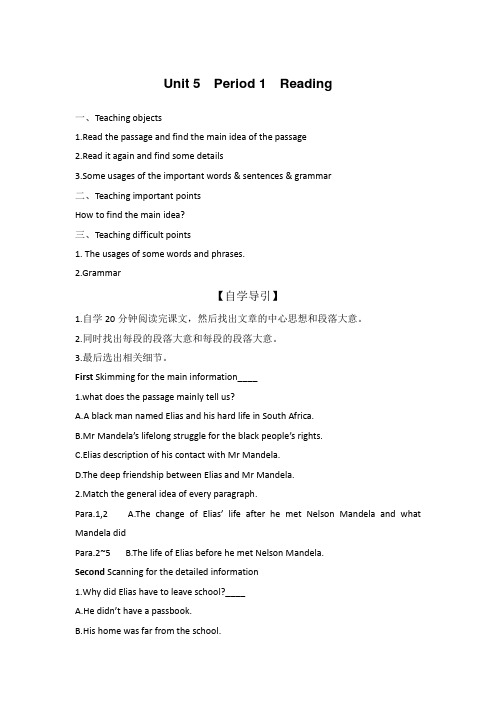
Unit 5 Period 1 Reading一、Teaching objects1.Read the passage and find the main idea of the passage2.Read it again and find some details3.Some usages of the important words & sentences & grammar二、Teaching important pointsHow to find the main idea?三、Teaching difficult points1. The usages of some words and phrases.2.Grammar【自学导引】1.自学20分钟阅读完课文,然后找出文章的中心思想和段落大意。
2.同时找出每段的段落大意和每段的段落大意。
3.最后选出相关细节。
First Skimming for the main information____1.what does the passage mainly tell us?A.A black man named Elias and his hard life in South Africa.B.Mr Mandela’s lifelong struggle for the black people’s rights.C.Elias description of his contact with Mr Mandela.D.The deep friendship between Elias and Mr Mandela.2.Match the general idea of every paragraph.Para.1,2 A.The change of Elias’life after he met Nelson Mandela and what Mandela didPara.2~5 B.The life of Elias before he met Nelson Mandela.Second Scanning for the detailed information1.Why did Elias have to leave school?____A.He didn’t have a passbook.B.His home was far from the school.C.His family couldn’t afford the school feesD.He couldn’t read or write.2.Nelson Mandela opened a black law in order to____A.make moneyB.help the poor black people with their problemsC.make himself famous.D.study law3.How did Nelson Mandela help Elias keep his job?______.A.He talked with Elias’ bossB.He helped him get the correct papers.C.He lent him some moneyD.He asked him to go to court.4.Why did Elias help Nelson Mandela blow up some government buildings?A.He liked violence.B.It was not dangerous.C..It was a way to make black and white people equal.D.He wanted to be famous.5.What dream did Nelson Mandela have?A.To become the president of South Africa.B.To win the Nobel Peace Prize.C.To make black and white people equal.D.To blow up some government buildings.Third Intensive reading to finish the passage.Elisa is a poor 1.____worker in South Africa. He began school at six years old and 2._ ____school two years later because his family couldn’t afford the school 3._____and the bus fare. After trying hard, he got a job in a 4._____mine. At that time because he didn’t have a 5._____to live in Johannesburg, he would probably became out of 6.______. He first met Mandela at twelve years old, in the year 1952, when Mandela was a black 7.______.Mandela helped poor people to solve their 8._____matters. Mandela told Elias how to get the correct papers so he could stay inJohannesburg. Elias joined the ANC Youth League 9.____by Mandela to realize their dream of making black and white people 10_____.【重点词汇】1._________ n.质量,品质2.__________ adj.吝啬的,自私的,卑鄙的3._________ vt.建立,建设4._________ n.共和国,共和政体5.__________n.人类6._________ n.法则,原则,原理7.__________vt.献身,专心于→_______adj.忠实的,深爱的→______n.奉献8._______ n.自身→_____adj.自私的→______adj.无私的,忘我的→_____adv.无私地,忘我地9.__________adj.积极的,活跃的→______adv.积极地10.__________adj.慷慨的,大方的→__________n.慷慨,大方11.__________ adj.和平的,平静的→______n.平安,平静12.__________ n.法律的,依照法律的→_______adj.非法的13.__________ vt.指导→_______n.指导14._____adj.相等的,平等的→______n.平等15.out of____ 失业16. _______ 事实上17._____ 在危险,痛苦,忧虑的处境中18.turn___ 求助于19._______丧失勇气20._______当权21.set___建立,设立22._____被判处...(徒刑)【合作探究】1.The last thirty years have seen the greatest number of laws stopping our rights and progress, until today we have reached a stage where we almost no rights at all分析:此句为主从复合句。
贵州省贵阳清镇北大培文学校高中英语必修一导学案:Unit1 第五课时 听力与写作 Word版缺答案
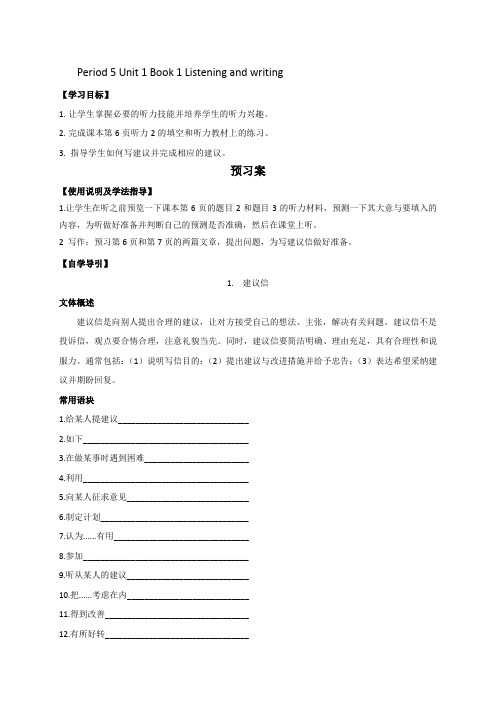
Period 5 Unit 1 Book 1 Listening and writing【学习目标】1.让学生掌握必要的听力技能并培养学生的听力兴趣。
2.完成课本第6页听力2的填空和听力教材上的练习。
3. 指导学生如何写建议并完成相应的建议。
预习案【使用说明及学法指导】1.让学生在听之前预览一下课本第6页的题目2和题目3的听力材料,预测一下其大意与要填入的内容,为听做好准备并判断自己的预测是否准确,然后在课堂上听。
2 写作:预习第6页和第7页的两篇文章,提出问题,为写建议信做好准备。
【自学导引】1. 建议信文体概述建议信是向别人提出合理的建议,让对方接受自己的想法、主张,解决有关问题。
建议信不是投诉信,观点要合情合理,注意礼貌当先。
同时,建议信要简洁明确、理由充足,具有合理性和说服力。
通常包括:(1)说明写信目的;(2)提出建议与改进措施并给予忠告;(3)表达希望采纳建议并期盼回复。
常用语块1.给某人提建议______________________________2.如下______________________________________3.在做某事时遇到困难________________________4.利用______________________________________5.向某人征求意见____________________________6.制定计划__________________________________7.认为......有用_______________________________8.参加______________________________________9.听从某人的建议____________________________10.把......考虑在内____________________________11.得到改善_________________________________12.有所好转_________________________________13.依我看来_________________________________14.我已收到你的来信,得知你......____________________________________________15.我建议......___________ _____________________套用句式1.你就......向我寻求建议,我会尽力提一些建设性的建议。
- 1、下载文档前请自行甄别文档内容的完整性,平台不提供额外的编辑、内容补充、找答案等附加服务。
- 2、"仅部分预览"的文档,不可在线预览部分如存在完整性等问题,可反馈申请退款(可完整预览的文档不适用该条件!)。
- 3、如文档侵犯您的权益,请联系客服反馈,我们会尽快为您处理(人工客服工作时间:9:00-18:30)。
课时作业(3)一.填入正确的关系代词或关系副词1.We are living in an age ____many things are done on computers.2.I can think of many cases_____students obviously knew a lot of English words and expressions but couldn’t write a good essay.3.I can think of many cases_____you knew noting about.4.I want to know the date _____you were born.5.I have remembered the date_____I forgot just now.6.Do you know the reason____he is absent today?7.This is the factory_____his father works.8.This is the factory_____his father built.9.The key _____she was opening the door broke.10.The library____we often go on Sundays is not far from our school.二.单句改错1.What college students are mainly concerned about is employment and their dream is to have well-paid jobs which they can live their lives to the best.2.We shouldn’t spend our money testing so many people, most of them are healthy.3.She showed the visitors around the museum, the construction of it took more than three years.4.He was educated at the local high school, after that he went on Beijing University.5.It is reported that two schools, both of them are being built in my home town, will open next year.6.I saw a woman running toward me in the dark. Before I could recognize who she was, she had ran back in the direction from that she had come.7.We went through a period with which communications were very difficult in rural area.8.They will fly to Washington, in where they plan to stay for two or three days.9.I’ll give you my friend’s home address, I can be found most everything.10.For many cities in the world, there is no room to spread out further, in which New York is an example.三.阅读理解Hollywood’s theory that machines with evil(邪恶) minds will drive armies of killer robots is just silly. The real problem relates to the possibility that artificial intelligence(AI) may become extremely good at achieving something other than what we really want. In 1960 a well-known mathematician Norbert Wiener, who founded the field of cybernetics(控制论), put it this way: “If we use, to achieve our purposes, a mechanical agency with whose operati on we cannot effectively interfere(干预), we had better be quite sure that the purpose put into the machine is the purpose which we really desire.”A machine with a specific purpose has another quality, one that we usually associate with living things: a wish to preserve its own existence. For the machine, this quality is not in-born, nor is it something introduced by humans; it is a logical consequence of the simple fact that the machine cannot achieve its original purpose if it is dead. So if we send out a robot with the single instruction of fetching coffee, it will have a strong desire to secure success by disabling its own off switch or even killing anyone who might interfere with its task. If we are not careful, then, we could face a kind of global chess match against very determined, super intelligent machines whose objectives conflict with our own, with the real world as the chessboard.The possibility of entering into and losing such a match should concentrate the minds of computer scientists. Some researchers argue that we can seal the machines inside a kind of firewall, using them to answer difficult questions but never allowing them to affect the real world. Unfortunately, that plan seems unlikely to work: we have yet to invent a firewall that is secure against ordinary humans, let alone super intelligent machines.Solving the safety problem well enough to move forward in AI seems to be possible but not easy. There are probably decades in which to plan for the arrival of super intelligent machines. But the problem should not be dismissed out of hand, as it has been by some AI researchers. Some argue that humans and machines can coexist as long as they work in teams—yet that is not possible unless machines share the goals of humans. Others say we can just “switch them off” as if super intelligent machines are too stupid to think of that possibility. Still others think that super intelligent AI will never happen. On September 11, 1933, famous physicist Ernest Rutherford stated, with confidence, “Anyone who expects a source of power in the transformation of these atoms is talking moonshine.” However, on September 12, 1933, physicist Leo Szilard invented theneutron-induced(中子诱导) nuclear chain reaction.67. Paragraph 1 mainly tells us that artificial intelligence may .A. run out of human controlB. satisfy human’s real desiresC. command armies of killer robotsD. work faster than a mathematician68. Machines with specific purposes are associated with living things partly because they mightbe able to .A. prevent themselves from being destroyedB achieve their original goals independentlyC. do anything successfully with given ordersD. beat humans in international chess matches69. According to some researchers, we can use firewalls to .A. help super intelligent machines work betterB. be secure against evil human beingsC. keep machines from being harmedD. avoid robots’ affecting the world70. What does the author think of the safety problem of super intelligent machines?A. It will disappear with the development of AI.B. It will get worse with human interference.C. It will be solved but with difficulty.D. It will stay for a decade.四.语法填空In 1863the first underground passenger railway in the world opened in London. It ran for just under seven kilometers and allowed people to avoid terrible __1__(crowd) on the roads above as they travelled to and ___2__ word. It took three years to complete and was built using an interesting method. This included digging up the road, ____3___(lay) the track and then building a strong roof over___4___ top. When all those had been done, the road surface was replaced.Steam engines ___5__(use) to pull the carriages and it must have been___6_(fair)unpleasant for the passengers, with all the smoke and noise. However, therailway quickly proved to be a great success and within six months, more than 25,000 people were using___7__ every day.Later, engineers ____8___(manage) to construct railways in a system of deep tunnels (隧道), which became known to the tube. This development was only possible with the ___9___ (introduce) of electric-powered engines and lifts. The central London Railway was one of the most ___10___(success) of these new lines, and was opened in 1900. It had white-painted tunnels and bright red carriages, and proved extremely popular with the public.选做题:七选五阅读Interruptions are one of the worst things to deal with while you’re trying to get work done.1 ,there are several ways to handle things.Let’s take a look at them now.2 .Tell the person you’re sorry and explain that you have a million things to do and then ask if the of you can talk at a different time.When people try to interrupt you,have set hours planned and let them know to come back during that tim e or that you’ll find them then. 3 .It can help to eliminate(消除) future interruptions.When you need to someone,don’t do it in your own office. 4 .it’s much easeier to excuse yourself to get back to your work than if you try to get someone out of your space even after explaining how busy you areIf you have a door to your office,make good use of it. 5 .If someone knocks and it’s not an important matter. Excuse yourself and let the person know you’re busy so they can get the hint(暗示) th an when the door is closed,you’re not to be disturbed.A.If you’re busy, don’t feel bad about saying noB. When you want to avoid interruptions at workC. Set boundaries for yourself as your time goesD. If you’re in the other person’s office or in a public arceaE. It’s important that you let them know when you’ll be availableF.It might seem unkind to cut people shirt when they interrupt youG.Leave it open when you’re available to talk and close it when you’re not。
